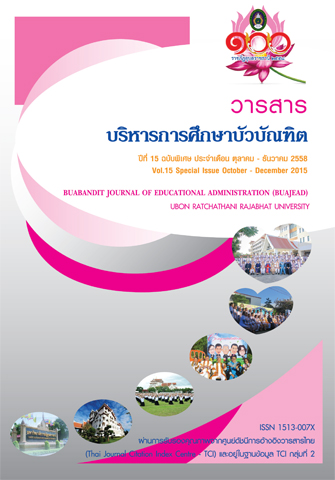การพัฒนาการจัดการเรียนรู้โดยประยุกต์แนวคิดการใช้ปัญหาเป็นฐานประกอบกลุ่มร่วมมือ วิชา การบัญชีเบื้องต้น เพื่อส่งเสริมผลสัมฤทธิ์ทางการเรียนและแรงจูงใจใฝุสัมฤทธิ์ ของนักเรียนระดับประกาศนียบัตรวิชาชีพ (ปวช.) ชั้นปีที่ 1
Main Article Content
บทคัดย่อ
การวิจัยครั้งนี้มีความมุ่งหมายเพื่อ 1) ศึกษาข้อมูลพื้นฐานที่เกี่ยวข้องและพัฒนาการจัดการเรียนรู้ โดยใช้ปัญหาเป็นฐานและกลุ่มร่วมมือ เพื่อส่งเสริมผลสัมฤทธิ์ทางการเรียนและแรงจูงใจใฝ่สัมฤทธิ์ สำหรับนักเรียน ระดับประกาศนียบัตรวิชาชีพชั้นปีที่ 1 2) ศึกษาผลการจัดการเรียนรู้โดยประยุกต์แนวคิดการใช้ปัญหาเป็นฐาน และกลุ่มร่วมมือ วิชาการบัญชีเบื้องต้น ประกอบด้วย 2.1) ศึกษาประสิทธิภาพของการจัดการเรียนรู้โดยประยุกต์ แนวคิดการใช้ปัญหาเป็นฐานประกอบกลุ่มร่วมมือ วิชาการบัญชีเบื้องต้น ตามเกณฑ์ 80/80 2.2) เปรียบเทียบ ผลสัมฤทธิ์ทางการเรียนของนักเรียน ระหว่างก่อนเรียนและหลังเรียนด้วยการจัดการเรียนรู้โดยประยุกต์แนวคิด การใช้ปัญหาเป็นฐานประกอบกลุ่มร่วมมือ 2.3) เปรียบเทียบแรงจูงใจใฝุสัมฤทธิ์ระหว่างก่อนเรียนและหลังเรียน ด้วยการจัดการเรียนรู้โดยประยุกต์แนวคิดการใช้ปัญหาเป็นฐานประกอบกลุ่มร่วมมือกลุ่ม การวิจัยครั้งนี้ใช้ กระบวนการวิจัยและพัฒนา ประกอบด้วย 3 ระยะ ได้แก่ ระยะ 1 ศึกษาข้อมูลพื้นฐานที่เกี่ยวข้องกับข้อมูลพื้นฐาน ด้านปัญหา ความต้องการในการจัดการเรียนรู้วิชาการบัญชีเบื้องต้น ด้วยการสอบถาม การสัมภาษณ์และสังเกต ชั้นเรียน รวมทั้งศึกษาแนวคิดทฤษฎีที่เกี่ยวข้อง และนำมาสังเคราะห์ออกแบบการจัดการเรียนรู้ แล้วให้ผู้เชี่ยวชาญ ตรวจสอบคุณภาพและความเหมาะสม ระยะที่ 2 การนำการจัดการเรียนรู้ที่ออกแบบในระยะแรก ไปทดลองใช้ กับนักเรียนชั้นประกาศนียบัตรวิชาชีพชั้นปีที่ 1 และปรับปรุงในประเด็นที่ยังไม่สมบูรณ์ให้มีคุณภาพและเหมาะสม ยิ่งขึ้น ระยะที่ 3 นำการจัดการเรียนรู้ไป ใช้จริงกับนักเรียนกลุ่มตัวอย่าง ซึ่งมีครูกลุ่มเป้าหมายที่ให้ข้อมูลพื้นฐาน ด้านการจัดการเรียนรู้วิชาการบัญชีเบื้องต้น ได้แก่ ครูผู้สอนวิชาบัญชี 1 คน และครูวิชาการ 1 คน กลุ่มตัวอย่าง นักเรียนในการตอบแบบสอบถาม จานวน 100 คน และกลุ่มตัวอย่างนักเรียนในการวิจัย ได้แก่ นักเรียน ประกาศนียบัตรวิชาชีพชั้นปีที่ 1 วิทยาลัยเทคโนโลยีคุวานันท์ จำนวน 37 คน ปีการศึกษา 2557 ซึ่งได้มาจาก การสุ่มแบบกลุ่ม เครื่องมือที่ใช้ในการวิจัย ได้แก่ 1) แบบสอบถามนักเรียนเกี่ยวกับการจัดกิจกรรมการเรียนรู้ ในรายวิชาที่เกี่ยวข้อง จำนวน 20 ข้อ 2) แบบสัมภาษณ์ครูและนักเรียน 3) แบบสังเกตพฤติกรรมนักเรียนในชั้นเรียน 4) แผนการจัดการเรียนรู้วิชาการบัญชีเบื้องต้น ระดับประกาศนียบัตรวิชาชีพชั้นปีที่ 1 จำนวน 9 แผ่น รวมเวลา 18 ชั่วโมง 5) แบบทดสอบวัดผลสัมฤทธิ์ทางการเรียน จำนวน 30 ข้อ 6) แบบวัดแรงจูงใจใฝ่สัมฤทธิ์ทางการเรียน จำนวน 25 ข้อ สถิติที่ใช้วิเคราะห์ข้อมูล ได้แก่ ร้อยละ ค่าเฉลี่ย ส่วนเบี่ยงเบนมาตรฐาน และทดสอบสมมุติฐาน ด้วยสถิติ t – test (Dependent Samples)
ผลการวิจัยปรากฏดังนี้
1. ข้อมูลสภาพปัญหาและความต้องการในการจัดการเรียนรู้ วิชาการบัญชีเบื้องต้นของนักเรียน ระดับประกาศนียบัตรวิชาชีพชั้นปีที่ 1 พบว่า นักเรียนยังไม่ได้รับการส่งเสริมผลสัมฤทธิ์ทางการเรียนและแรงจูงใจ ใฝ่สัมฤทธิ์ในการเรียน ประกอบการเรียนรู้วิชาการบัญชีเบื้องต้นเท่าที่ควร และยังต้องการพัฒนาการจัดการเรียนรู้ ในรายวิชาดังกล่าว ให้มีคุณภาพมากขึ้น ซึ่งผลการพัฒนาการจัดการเรียนรู้โดยประยุกต์แนวคิดการใช้ปัญหาเป็นฐาน ประกอบด้วย 5 ขั้น ได้แก่ 1) ขั้นเผชิญปัญหา 2) ขั้นวางแผนค้นหาคำตอบ 3) ขั้นตรวจสอบทบทวนการแก้ปัญหา 4) ขั้นประเมินและสะท้อนผล 5) ขั้นสรุปผลการแก้ปัญหาและนาไปใช้ และปรากฏผลการประเมินคุณภาพและ ความเหมาะสมของแผนการจัดการเรียนรู้โดยผู้เชี่ยวชาญ พบว่า แผนการจัดการเรียนรู้รายแผนมีคุณภาพและ ความเหมาะสมอยู่ในระดับมากถึงมากที่สุด และผลการประเมินโดยรวมอยู่ในระดับมาก
2. ผลการจัดการเรียนรู้โดยประยุกต์แนวคิดการใช้ปัญหาเป็นฐานและกลุ่มร่วมมือ วิชาการบัญชี เบื้องต้น พบว่า
2.1 แผนการจัดการเรียนรู้โดยประยุกต์แนวคิดการใช้ปัญหาเป็นฐานประกอบกลุ่มร่วมมือ วิชาการบัญชีเบื้องต้น ระดับประกาศนียบัตรวิชาชีพชั้นปีที่ 1 มีประสิทธิภาพเท่ากับ 83.86/ 89.46 ซึ่งสูงกว่า เกณฑ์ที่กาหนดไว้ 80/80
2.2 นักเรียนที่ได้รับการจัดการเรียนรู้โดยประยุกต์แนวคิดการใช้ปัญหาเป็นฐานประกอบ กลุ่มร่วมมือ มีผลสัมฤทธิ์ทางการเรียนหลังเรียนสูงกว่าก่อนเรียน อย่างมีนัยสำคัญทางสถิติที่ระดับ .05
2.3 นักเรียนที่ได้รับการจัดการเรียนรู้โดยประยุกต์แนวคิดการใช้ปัญหาเป็นฐานประกอบ กลุ่มร่วมมือ มีแรงจูงใจใฝ่สัมฤทธิ์ทางการเรียน หลังเรียนสูงกว่าก่อนเรียน อย่างมีนัยสำคัญทางสถิติที่ระดับ .05
Development of Learning Management Based on Problem-Based Learning and Cooperative Learning to Enhance Academic Achievement and Achievement Motivation of Professional Certificate Students for the First Year Level, in Basic Accounting Subject
The purpose of this study were : 1) to develop learning management based on Problem-Based Learning and Cooperative learning to enhance academic achievement and achievement motivation of Professional Certificate students for the first year level in Basic Accounting Subject, 2) to study for the outcomes of learning management based on Problem- Based Learning and Cooperative learning of Professional Certificate students for the first year level, which were composed of : 2.1) to find the efficiency of learning management, based on Problem-Based Learning and Cooperative learning with the required establishment of 80/80, 2.2) to compare academic achievement of students, between before and after learning based on that approach, and 2.3) to compare achievement motivation of students, between before and after learning based on that approach, 2.3) to compare achievement motivation of students, between before and after learning based on that approach. This study was provided on Research and Development methodology for 3 phases in the academic year of 2014, those were : The first phase was studied for the preliminary problems and needs concerned with learning management in Basic Accounting for the professional certificate, by using the questionnaire, interviewing, and observing activities in class. Including reviewed for the principles and concerned theories for synthesizing of learning management strategy with Problem-Based Learning and Cooperative learning to enhance academic achievement and achievement motivation of students. Then proposed of learning management for the experts to evaluate appropriateness of learning management before implement with students. The research instruments were comprised of : 1) questionnaire for the students replying about current state of leaning management , 2) interviewing forms for teachers and students about problems and needs of learning management, 3) observing form for classroom learning activities, 4) plans for learning management based on Problem-Based Learning and cooperative learning for 9 plans, with 18 hours, 5) a 30-the academic achievement test, 6) 25 item scale of achievement motivation. The statistics used for analyzing data were percentage, mean, standard deviation, and t-test (Dependent sample) was employed for testing hypotheses.
The results of study were as follows :
1. The results of study for preliminary information of current state and problems about needs for learning management for basic accounting subject in concerned school, were found that students pertained in problems and needs to improve of higher academic achievement and achievement motivation. The author synthesized and designed for learning management based on Problem-Based learning and cooperative learning to promote achievement and achievement motivation of learners, which composed of 5 steps were as: 1) Confronting of problems, 2) Planning to investigate solutions, 3) Proving and reviewing of problem solving, 4) Assessing and reflecting and 5) Concluding of solutions and applying, and evaluating for quality and appropriateness of learning management plans by experts were at a high to highest level for each plan, and was at a high level for overall of plans.
2. The outcomes of learning management based on Problem-Based learning and cooperative learning approach to promote achievement and achievement motivation of learners, in basic accounting subject were as :
2.1 The learning management based on Problem-Based learning and cooperative learning, had the efficiency of 83.86/89.46, which was higher than the criterion establishment of 80/80.
2.2 The students who learned based on Problem-Based learning and cooperative learning showed higher of achievement in basic accounting subject than before learning at the .05 level of significance.
2.3 The students who learned based on Problem-Based learning and cooperative learning showed higher of achievement motivation than before learning, at the .05 level of significance.

